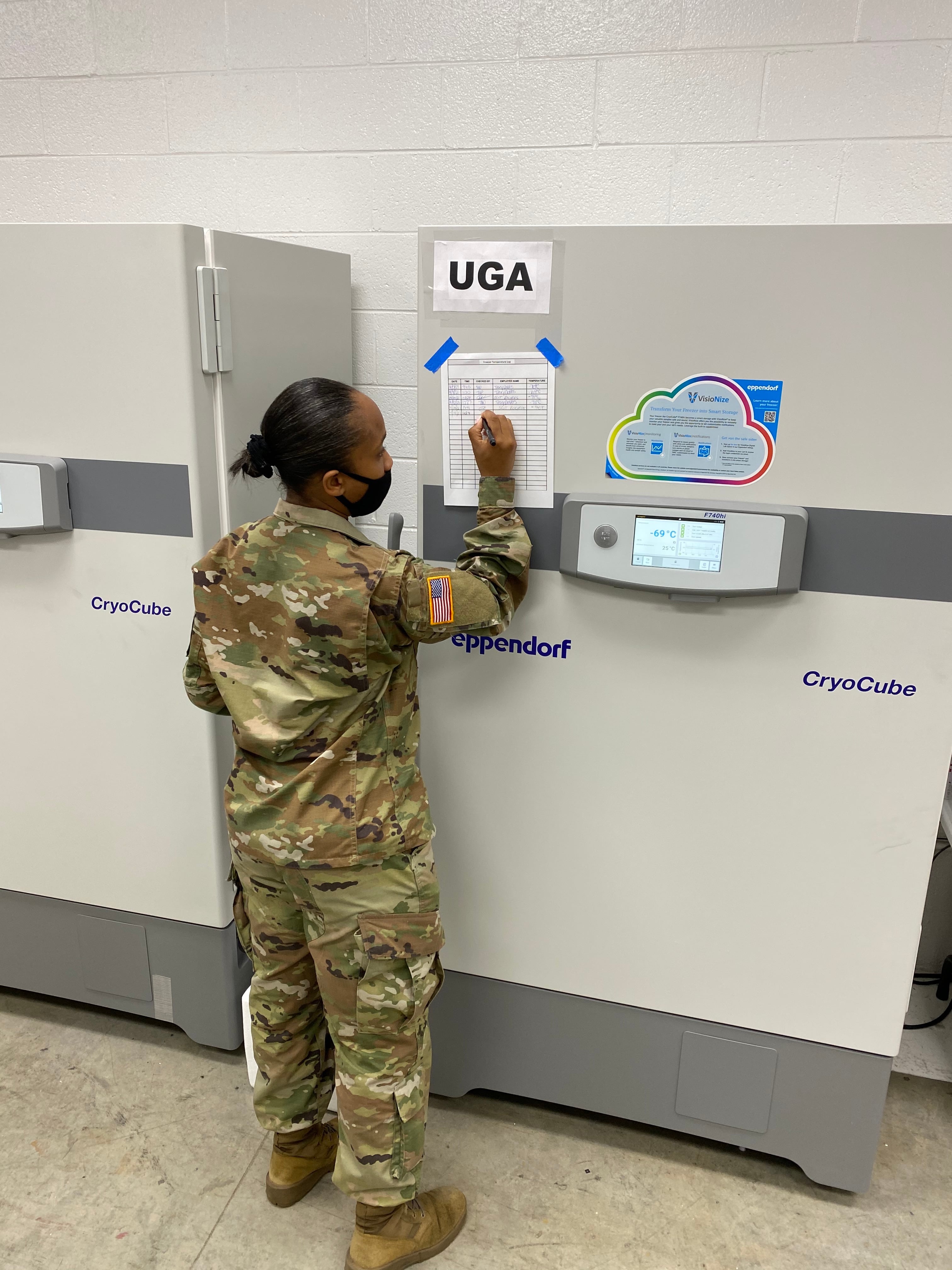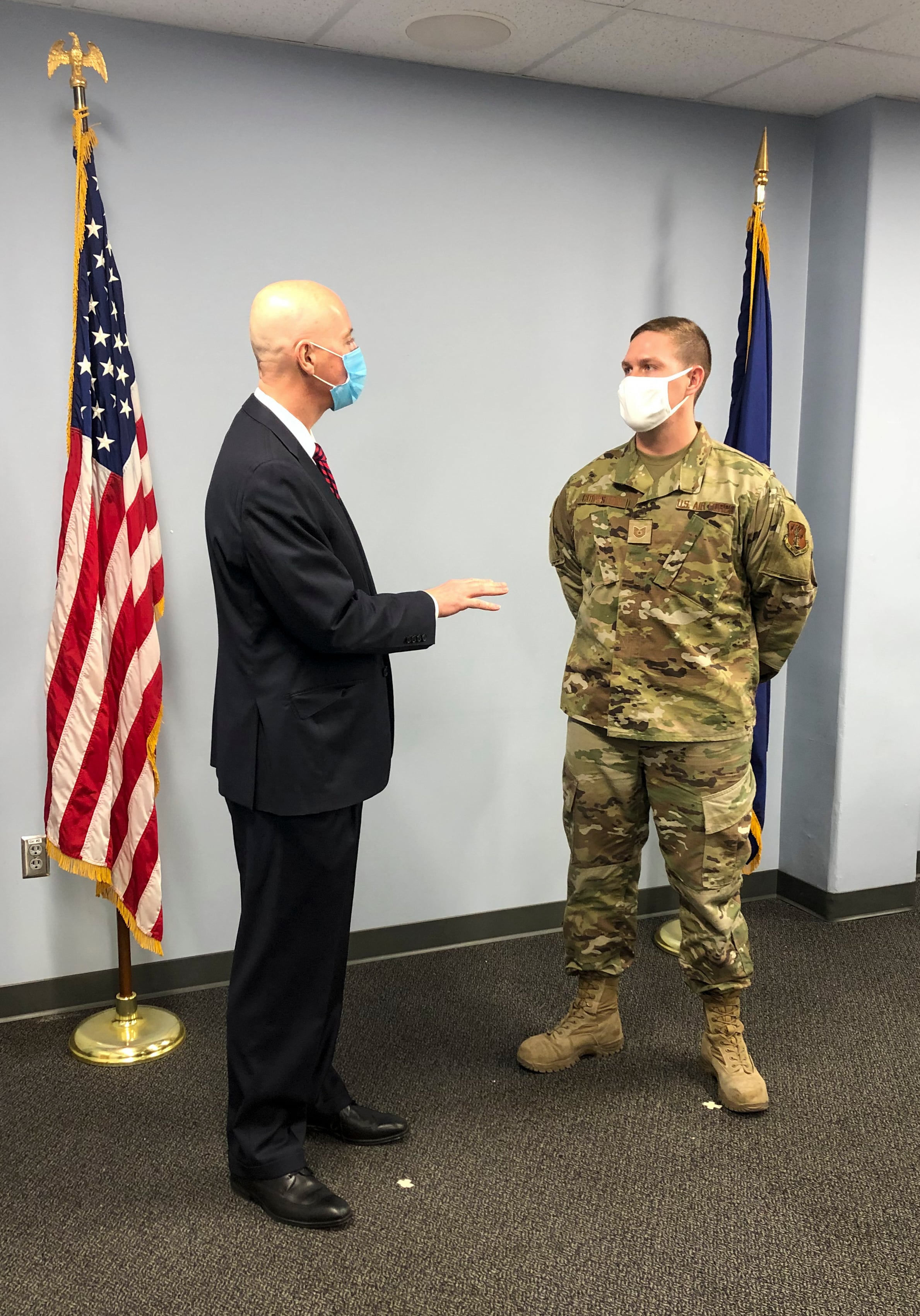The National Guard’s response to the COVID-19 pandemic began before dawn. In the early morning hours of March 5, 2020, a pararescue team from the 129th Rescue Wing of the California Air National Guard boarded a helicopter bound for virus-stricken cruise ship Grand Princess to administer COVID-19 tests to passengers.
Since then, tens of thousands of National Guard troops have been called to state active duty or mobilized via Title 32 orders funded by the Federal Emergency Management Agency for pandemic response.
A handful of those soldiers and airmen have been on duty non-stop since the early weeks of the Guard’s response, though nobody is certain how many troops fall into the category of year-long pandemic veterans. One thing is certain: this is a small club — so far.
“Unfortunately, the office that tracks personnel does not have a system of record to capture individual orders for domestic operations,” said a National Guard Bureau official in an email to Military Times. “Orders are published at the state [level] and you would have to contact each state individually.”
Some states told Military Times that they don’t have any year-long pandemic vets.
“Maybe a planner or two in our Joint Staff,” said one state public affairs officer via email.
“We don’t have any of those,” said another on the phone.
But two states contacted by Military Times — Nebraska and Georgia — were each able to identify such a vet and made them available to discuss their experiences running logistics throughout the Guard’s COVID-19 response and describe the pandemic year through their eyes.
As the mission stretches on, though, more and more Guard troops will soon mark a year responding to the pandemic.
“12-hour days, seven days a week”
That’s how the early days of the pandemic response looked for Sgt. Kenesha Rogers, a supply specialist assigned to the headquarters detachment of the Georgia Army National Guard’s 78th Troop Command. She sat down with Military Times in an office adjacent to a contracted warehouse in Kennesaw, a ten-minute drive away from the state’s headquarters in Marietta, Georgia.

Rogers has been activated supporting the state of Georgia’s warehouse and distribution operations since March 2020, when she got a phone call from her Guard supervisor.
“Hey, if you’re not too busy, and if you can,” the supervisor asked, “can you report to Kennesaw tomorrow?”
It was Rogers’ first ever call to state active duty in her 12-year career. She had a previous overseas deployment.
“When I got the call, I’m thinking, ‘OK — maybe a month, maybe two,’” she recalled thinking. “We’re stateside. This can’t go on for that long.”
That’s what she told her civilian employer, a “close friend” who owns a local security contracting company.
When Rogers arrived, she immediately began work processing “a crazy amount of” requests for medical equipment from hospitals and other facilities around the state.
Health protection restrictions in the early days of the pandemic also meant that Rogers initially had to stay in a hotel. She wasn’t able to go home to see her 4-year-old daughter, Skyler.
“Before the pandemic, we were seeing each other every day,” she said. “That was the toughest.” She’s been leaning on her family to help out with Skyler while she’s been away.
Soon, though, it became apparent in June that the pandemic — and the mission — wouldn’t be going away anytime soon. That’s when Rogers decided she was all-in and told her Department of Public Health supervisor, “I’ll be here until y’all [aren’t] here, as long as I can help it.”
That’s possible because she’s using the pandemic as a springboard for a career change. “I’m actually studying to get my real estate license now,” she proudly shared. “If we actually do end [COVID-19 response] in September...I’ll be well into real estate by then.”
“We showed up to a warehouse…that was empty”
That was the initial reaction of Tech Sgt. Andrew Cookston, a member of the Nebraska Air National Guard assigned to the 155th Logistics Readiness Squadron, when he first reported for pandemic duty on April 10, 2020.
“I was [expecting to be] on orders for 10 days to two weeks, just to kind of help get everybody up and running,” in the state’s emergency medical equipment warehouse, said Cookston, who lives on a 25-acre farm “right outside of” the state’s capital, Lincoln.
His wife and two sons were worried at first, he said. But his civilian employer — BNSF Railway — has been “one of the best employers when it comes to understanding [the] military,” which has made it possible for him to stay on orders.
When first he drove into town and reported to the warehouse in Lincoln, Cookston found it empty…but not for long.
“We’re all kind of sitting there a couple different days, just staring at each other wondering, you know, ‘what’s going on, where we’re supposed to be.’ We were all very confused,” he said on the phone as he sat in a back office. “In hindsight, we should have enjoyed those couple of days, because then the floodgates opened and truck, after truck, after truck started showing up.”
After withstanding the initial deluge, Cookston started working with his Guard colleagues and Nebraska to streamline the PPE request process for hospitals and health departments, developing an online request system to standardize orders.
Rogers, the Georgia soldier, also remarked on the scale of demand for equipment during the early months.
Gesturing towards a room filled with ventilators, Rogers explained how they “couldn’t” keep them in stock during previous case surges that nearly overwhelmed the state’s intensive care units.
Now, the stocks are replenished, and the Kennesaw warehouse is filled to the brim with medical equipment. The main items in demand today? Vaccines and their ancillary injection kits, said Rogers.
Transition to vaccines
For both Rogers and Cookston, the Guard’s shift towards vaccine distribution and administration was significant — in both symbolism and changes in their duties.

Rogers recently took over as assistant logistics section chief at the Kennesaw warehouse — a testament to her longevity on the mission. Every third Saturday, though, the warehouse’s parking lot becomes a drive-thru vaccine clinic administering Pfizer shots.
Those days are even busier for her. She acts as a runner ensuring everyone at their stations has what they need. “Everyone here has played a significant role,” she explained.
She was able to see the true business end of the operation in February, when she delivered a data logger to the mass vaccination site at Atlanta’s Mercedes-Benz Stadium.
“Just to see…[the stadium] transformed into a vaccine center was crazy,” she remarked. “The line was pretty long, but it was helpful to see people getting what they need, and people in that field stepping up so Georgia can get back to some normalcy.”
Cookston hasn’t been involved in vaccine administration in Nebraska — in March, he transitioned from his PPE ordering role to a new position coordinating vaccine distribution logistics as part of the state’s Vaccination Action Team — but he reflected on what it meant to observe a vaccine clinic in action after working tirelessly to get the shots to the clinics.
“It was very fulfilling that I could be [here] from the start, and now transition into the vaccine [role] and be able to see it literally being put into arms at a clinic,” said the airman. “I’m not sure there’s a way to describe the way that you feel seeing people’s faces light up with joy when they get to get the vaccine. And they understand that this is a step in the right direction to combat the entire pandemic.”
That hasn’t been Cookston’s only meaningful moment of the pandemic response, though.
In February, Nebraska Gov. Pete Ricketts visited the operations center for the vaccine task force and pinned on Cookston’s new rank insignia for his promotion to technical sergeant. Although he was receiving technical sergeant pay for months before February, Cookston had not had a promotion ceremony because the medical warehouse wasn’t adjacent to any of the state’s Guard facilities.
“I never had the opportunity to go and get formally pinned so I could wear my rank,” he explained. “And when I came into the vaccine side of the house, they saw that I was still wearing my [old] rank.”
A few days later, the governor came over to promote the Nebraska Guard’s longest-serving pandemic responder.
“I’m the only enlisted person that he’s formally pinned in the state of Nebraska,” Cookston said with pride.
Maybe he’ll still be on pandemic duty when it’s time for his next promotion. Cookston has been able to stay on duty close enough to home to spend more with his wife and two sons than he usually would during his civilian job with the railroad, which usually keeps him away from home.
“It’s been a great blessing in disguise.”
Davis Winkie covers the Army for Military Times. He studied history at Vanderbilt and UNC-Chapel Hill, and served five years in the Army Guard. His investigations earned the Society of Professional Journalists' 2023 Sunshine Award and consecutive Military Reporters and Editors honors, among others. Davis was also a 2022 Livingston Awards finalist.




